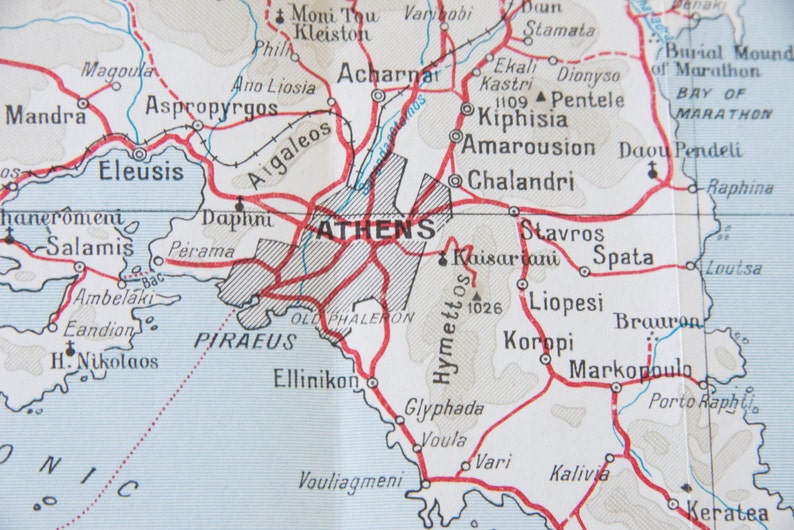about the horrors of Liosia (also written as 'Lucia' and
'Losyo') camp, 11 kilometers north of downtown Athens.//

Liosia is located just north of central Athens, along the rail
line - written in small letters 'Ano Liosia'.
A village chief’s statements:
I was taken prisoner by the Greeks for no reason on 19
December 1921,
transported by train to Karaköy and from there overland to Bursa
and
Mudanya, amid all sorts of insults, beatings and torture. After staying
out in the open and in the rain
at Mudanya for 24 hours, 40 of us
Moslem prisoners were put into a filthy
ship’s hold. We were taken by
ship over
2 days and 2 nights to Izmir without any food or water. In
Izmir, we were paraded in front of the
local Greeks and Greek soldiers
through the market and bazar, where they spat
in our faces and threw
eggplants, tomatos and rotten eggs at us, ruining our
clothes.
Then, under a thousand
degradations were taken to Tepecik Prisoners
Camp, where we stayed for 12
days. Next, suffering the same
degradations and beatings, we were taken to the Punta pier, where 44
of us were
put onto a ship for a 2-day voyage, without food or water,
to Piraeus. We were forced to march from Pireaus to
Athens, paraded
through Amutya (Omonia?) Square and subjected to taunts and
degradation
there before being put into Liosia Prison
Camp.
I returned to Turkey after 19.5 months in captivity. My friends
Ken’anzade Süleyman of Eskişehir,
an Eskişehir judge, printer Mustafa
Hocazade Ali Osman, Hacı Adil, Hoca Ali
Nazmi, scribe Hasan,
Karapazarlı İsmail Hakkı, Hacı Hafızzade Hakkı, lawyer
Osman Cudi,
his brother Süfyan and İtam director Hacı Nuri, along with İbrahım
the
son of Veli Ağa, also returned.
There were 22 Turkish officers at the
prison camp we stayed at but I
don’t know whether they returned or not.
There were more than 400 civilian prisoners from the Moslem
populace
of İzmit and Adapazarı at Liosia.
//Ed. Note: a detailed report about the POWs from Izmit
will be shared by TNT at the conclusion of this series.//
They were taken prisoner before we were and I heard that the Greeks
killed 100 people on the ship, as they came without food and water,
and threw
another 100 into the sea. Some of the
prisoners at Liosia
became ill after two years of beatings and torture and were
brought to
a hospital but died for lack of treatment.

The 'Punta' (now 'Alsancak') esplanade in Izmir.
Five months after the date of my capture, my friend Veli Ağa
died
while being brought to Izmir and his body was left at the Punta
railway
station. I know that many prisoners at Lucia were brought
to the
hospital, although they were not ill, and poisoned. The day
after, the Moslem clergymen among us
were brought to the camp
to give these poor souls the Islamic burial
rights. The Greeks often
happily
threatened us with poisoning.
Our food amounted to a loaf of bread for 8 people, a meager
amount of
bean soup full of worms and bitter, rotten olives. There were foreign and
harmful elements mixed
into the bread we got, which was made from
black scurfy wheat. As for water, the supply was erratic because
the
company wasn’t paid. When this
happened we were sometimes given
permission to get water from wells 1.5 hours
distance away. Most of
the time, though,
this permission was not given and we had no water.
There were many of our prisoners who died
from thirst. We prisoners
were subjected
to beatings and torture for no reason and suffered
degradation and unimaginable
inhumane treatment, as the Greeks saw
fit.
Hafız Ahmed, Chief of Dede Village, Eskişehir
//END of PART XXIII//

Hiç yorum yok:
Yorum Gönder